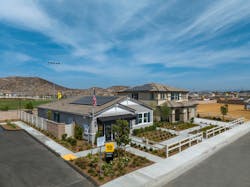KB debuts Microgrid communities in California
KB Home is launching an all-electric, solar and battery-powered microgrid solution for communities in California.
Every new energy-smart connected home at these communities will feature smart technologies and a backup battery and will be connected to a community microgrid, all of which will make the community capable of operating independently even during grid outages, the company said.
Homebuilder KB Home has collaborated with a slew of entities, including electric utilities and academic organizations, to launch its first all-electric, solar- and battery-powered, microgrid communities in California.
“Working with industry and academic leaders, we plan to explore how these energy-smart connected communities can help protect the environment and turn our homes into their own power centers designed to deliver resiliency while also reducing the overall cost of long-term homeownership,” said Jeffrey Mezger, KB Home’s Chairman, President and Chief Executive Officer.
For this, KB Home has joined forces with the U.S. Department of Energy, SunPower, the Advanced Power and Energy Program at the University of California, Irvine, Southern California Edison, Schneider Electric and carmaker Kia to build new energy-efficient and resilient homes in Oak Shade and Durango communities at its Menifee, California-based Shadow Mountain master project.
Every new energy-smart connected home at these communities will feature smart technologies and a backup battery and will be connected to a community microgrid, all of which will make the community capable of operating independently even during grid outages.
These new smart KB homes promises homeowners benefits like these –
· 40% reduction in energy usage, which will help homeowners reduce their energy costs
· Ability to switch to battery energy in case of a grid outage to keep the essential household energy functions ongoing for a certain period of time.
· Ability to monitor and control energy usage and storage through an app.
· The integrated community and home technologies will help the homeowners reduced their carbon footprint.
Additionally, these smart homes will be wired to make them smart charger ready, while some will be fitted with bidirectional electric vehicle chargers to source energy from EVs during a power outage.
The project partners will measure the energy efficiency of each KB smart connected community against that of the traditional residential solar communities and will explore ways to build all-electric homes that will more effectively meet the requirements of future energy codes.
About the Author
EnergyTech Staff
Rod Walton is head of content for EnergyTech.com. He has spent 17 years covering the energy industry as a newspaper and trade journalist.
Walton formerly was energy writer and business editor at the Tulsa World. Later, he spent six years covering the electricity power sector for Pennwell and Clarion Events. He joined Endeavor and EnergyTech in November 2021.
He can be reached at [email protected].
EnergyTech is focused on the mission critical and large-scale energy users and their sustainability and resiliency goals. These include the commercial and industrial sectors, as well as the military, universities, data centers and microgrids.
Many large-scale energy users such as Fortune 500 companies, and mission-critical users such as military bases, universities, healthcare facilities, public safety and data centers, shifting their energy priorities to reach net-zero carbon goals within the coming decades. These include plans for renewable energy power purchase agreements, but also on-site resiliency projects such as microgrids, combined heat and power, rooftop solar, energy storage, digitalization and building efficiency upgrades.
